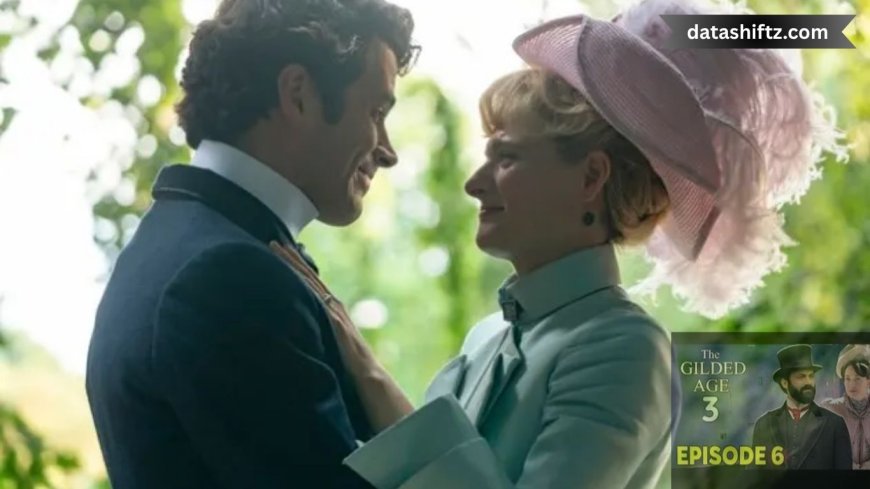The Gilded Age Season 3 Episode 6: “If You Want to Cook an Omelette” – A Dramatic Turning Point

July 27, 2025 | HBO / Max
Season 3, Episode 6 of The Gilded Age, titled “If You Want to Cook an Omelette,” delivers one of the series’ most emotionally powerful and surprising episodes yet. From resonant character arcs to devastating tragedy, the episode raises the stakes for upstairs and downstairs alike.
Plot Developments and Emotional Arcs
Dramatic Highlights
1. Bertha and Gladys’ Power Play
In England, Bertha Russell arrives at Sidmouth Castle to support her daughter Gladys in dealing with her domineering sister-in-law, Lady Sarah. Using strategic advice—“If you want to cook an omelette you have to learn to break a few eggs”—Bertha empowers Gladys to assert her position as Duchess. The confrontation culminates in Gladys stepping into her own power, forcing Lady Sarah to back down and earn Hector’s deeper respect.
2. George Russell’s Financial Collapse
Back in New York, George’s railroad empire crumbles when rival Sage leaks his financial details to the press. The Merrick brothers withdraw, the stock plunges, and George faces ruin—choosing defiance over surrender. The consequences are severe: his reputation and finances hang by a thread.
3. Larry and Marian’s Broken Engagement
Marian unravels Larry’s honesty after confronting him about a night involving Maud Beaton. Though Larry didn’t act inappropriately, his failure to be transparent destroys Marian’s trust. She ends their engagement by letter—even as Larry discovers a potentially fortune‑making copper vein in the West.
4. Oscar’s Redemption – and Loss
Oscar confronts Maud Beaton, now revealed not as a wealthy heiress but a victim of the same con man, Mr. Crowther. Learning of her tragic past—sold by her father in a card game—Oscar forgives her and gives her $100 plus a ticket to Sandusky, Ohio, a gesture of compassion and growth.
5. A Tragic Climax: John Adams’ Death
In a sudden, brutal twist, Oscar says farewell to John Adams—his secret lover and emotional support—and then witnesses him struck and killed by a horse‑drawn carriage. The crushing scene cements Oscar’s grief and the harsh reality of hidden love in 19th‑century society.
Character Stakes & Themes — Growth, Loss, and Social Boundaries
| Character(s) | Emotional Arc / Stakes | Theme Explored |
|---|---|---|
| Bertha & Gladys | Gladys asserts herself as Duchess; Bertha supports strategic rebellion | Power within patriarchy, agency |
| George Russell | Business empire crumbling; defiance vs. surrender | Wealth fragility, industrial risk |
| Marian & Larry | Engagement broken over distrust, despite Larry’s success | Honesty, love vs. ambition |
| Oscar & Maud | Oscar shows mercy; Maud’s trauma revealed | Redemption, survival, kindness |
| Oscar & John Adams | Hidden romance ends in tragedy; Oscar loses his confidant | Forbidden love, grief, societal constraint |
Episode 6 Highlights at a Glance
-
Bertha’s arrival in England reignites Gladys’ dormant agency as Duchess.
-
Lady Sarah vs. Gladys, fought through strategy, not rebellion.
-
George’s scandalous leak, stock crash, and business fallout.
-
Larry’s mineral discovery offers hope—amid personal heartbreak.
-
Marian confronts honesty, rejecting Larry’s half-truths.
-
Oscar meets his emotional breakthrough, then shocking loss.
-
John Adams’ tragic death stuns upstairs and downstairs worlds alike.
Emotional Resonance and Storytelling Impact
A Turning Point in Tone
Season 3 of The Gilded Age has leaned into emotional intensity and scandal more than prior seasons. Episode 6 exemplifies that shift—melding personal drama with calamity in ways that Julian Fellowes is known for, reminiscent of shock deaths in Downton Abbey.
Oscar’s True Evolution
Watching Oscar evolve—from bitter fortune hunter to compassionate gent—is central. His gift to Maud marks a moral turning point. Loss of John Adams, however, underscores how societal repression of their relationship blindsided him at its peak emotional moment.
Downstairs Breakthroughs and Inequities
Jack’s windfall from the clock patent brings him into the upstairs class—but also tension. Ada urges him to embrace his new status and responsibilities, while his peers are both proud and wary. His journey highlights class mobility—and the discomfort it causes in both worlds.
Final Thoughts: Why Episode 6 Matters
This episode is a microcosm of The Gilded Age’s biggest themes: class conflict, societal hypocrisy, family allegiance, and emotional sacrifice. As relationships fracture and characters make irreversible choices, the consequences reverberate across continents—from Sidmouth Castle to 61st Street.
Critics and fans alike responded to Episode 6 with shock and admiration. Outlets like The Daily Beast and Decider labeled John’s death “emotionally powerful,” while noting Fellowes’ penchant for tragedy. The moment Oscar calls John his “savior” adds emotional weight to what becomes a cruel ending





























